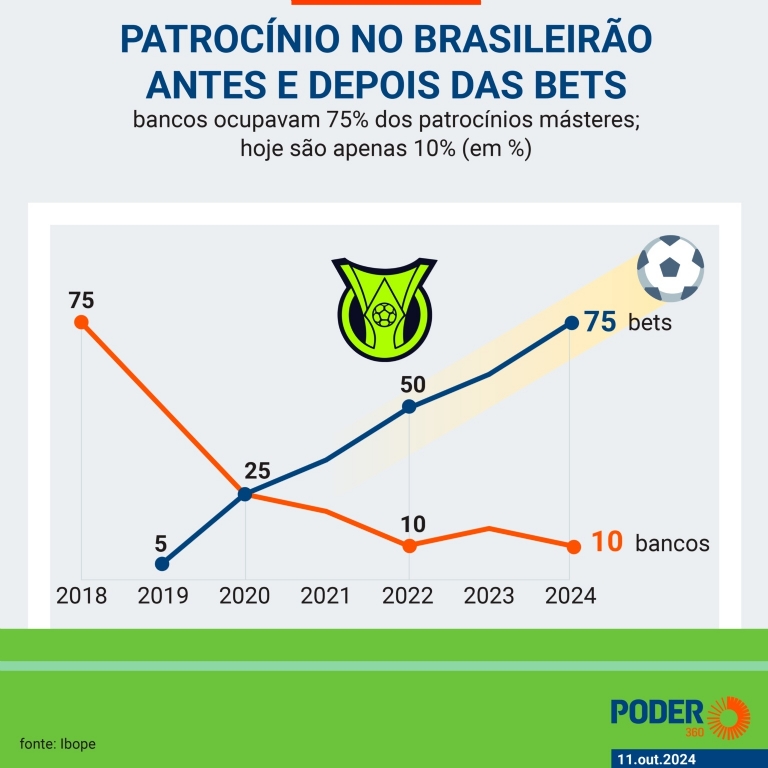

Brazil is truly a curious country. Just as the government begins to regulate and rigorously control what has existed in the country without any oversight for almost a decade, betting companies have overnight become the biggest villains of Brazilian health and economy.
While the billion-dollar industry operated in the shadows, with headquarters in tax havens due to the prohibition of establishing themselves here, words like gambling addiction or betting addiction didn’t appear in the press. Since it wasn’t a government issue, the problem was swept under the rug, as if it didn’t exist, without generating a cent in taxes.
All it took was for the government to set clear rules, through a meticulous and competent effort led by lawyer José Francisco Manssur at the Ministry of Finance, for the media to discover that sports betting or games of chance can be addictive.
It’s the typical case of selective discovery that periodically plagues the media. For at least seven years, betting companies have invaded TV, radio, and newspapers without any questioning. You can count on one hand the journalists who spoke out against betting.
Before the public opinion organized its general criticism, Lula was eyeing the potential R$3 billion (US$ 535m) in revenue. Now, Minister Fernando Haddad and the president himself claim that there is an epidemic of betting addicts and express concern about what is a global problem.
Here are some important questions:
The hypocrisy is so great that every day you can find reports in major outlets pointing out problems with betting companies, right next to ads for those same companies.
According to a survey by the newspaper O Estado de S. Paulo published in March 2023 and echoed in a recent study by Itaú Bank, betting companies poured (or injected) R$3.5 billion (US$ 625m) into Brazilian football. Since the study was conducted before the entry (and exit) of Vai de Bet into Corinthians, which caused an inflationary ripple effect in club advertising, the figures for 2024 are expected to exceed R$4 billion (US$ 712m).
The first significant sponsorship from the sector in Brazilian football was way back in December 2018, with Fortaleza. Without any action from Jair Bolsonaro’s government to create clear rules, betting companies became the main source of sponsorship for Brazil’s greatest passion.
Among the 40 clubs in the Série A and B of the Brazilian Championship, only Palmeiras and Cuiabá do not feature a betting company’s logo. However, in women’s football, Palmeiras has already joined in. The two main championships of the Brazilian Football Confederation (CBF) have Betano as the holder of naming rights.
Investment in media also reached billions. According to Ibope Monitor, open TV channels accounted for 44% of betting companies’ ad spend, with R$921 million (US$ 165m). The total media expenditure exceeded R$2.071 billion (US$ 370m) in 2023, a number that will surely increase in 2024.

A sectoral image crisis, as we know, does not happen by chance. There is significant interest from banks, retail, and other industries to slow down the public’s spending on sports betting. There’s only so much money. The more one sector grows, the less there is for others.
It’s clear that betting companies need to review some concepts and actively work to combat addiction. Today, technology allows for the tracking of accounts and data cross-checking. It doesn’t seem reasonable that beneficiaries of Bolsa Família should be able to use public funds to bet. Or that people with bad credit could see betting as an easy way out of their debts. Sports betting is entertainment, not a means of getting rich.
Like any crisis, the betting crisis has an expiration date. At some point, the subject will tire. The companies that truly support responsible gambling, weed out vulnerable individuals from their bases, and adopt strict compliance and security rules will survive.
In the past, society’s enemies were cigarettes, beer, banks, and construction companies. Tobacco still kills. Alcohol continues to destroy families and generate violence. Interest rates keep making bankers billionaires at the expense of millions of people’s misery. No one in their right mind can say that corruption in public works has disappeared. The only thing that has changed is the public’s frenzy to destroy the villain of the moment. The hysteria will soon die down.
Fernando Mello
Journalist and specialist in crisis management and the sports industry. Graduated from the University of São Paulo and with a post-graduate degree in Sports Management, he worked as a reporter and columnist for Folha de S.Paulo for eight years and has led the agency Press FC since 2004. He is vice president of the São Paulo Football Federation and won seven Cannes Lions in 2019.